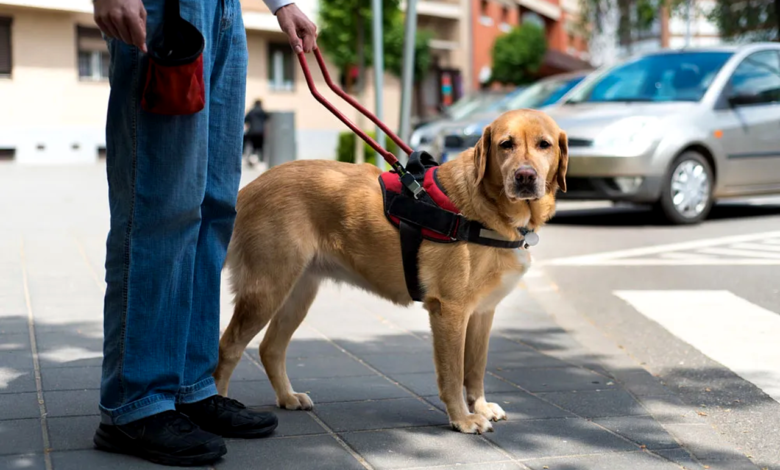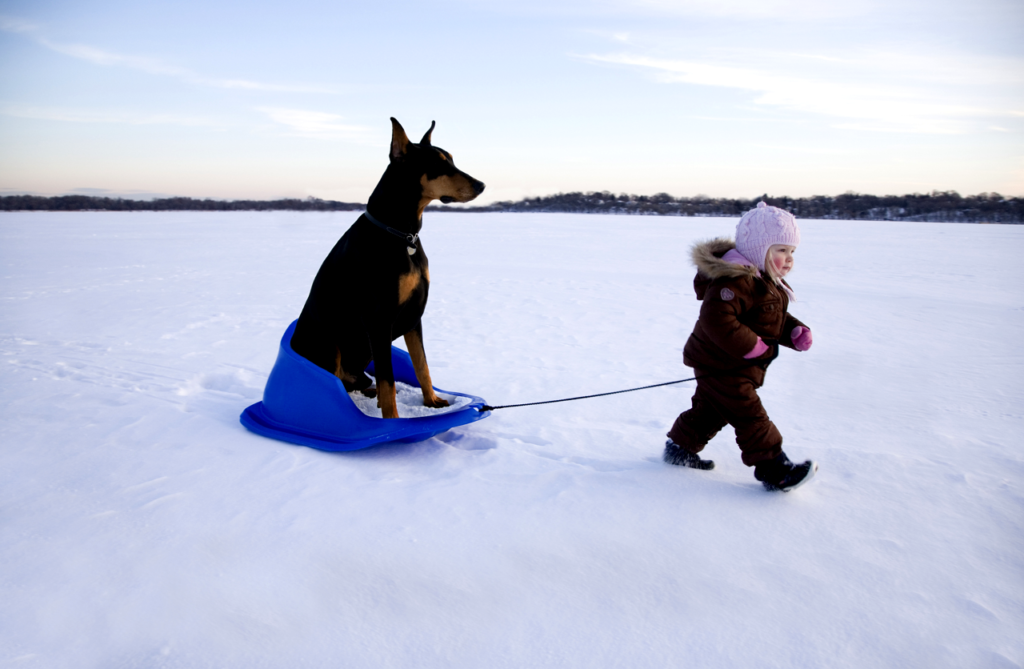
Service Animals: Supporting Individuals with Disabilities and Special Needs
Imagine a world where a furry companion isn’t just a friend but a lifeline, a source of independence, and a constant support system. Service animals play a crucial role in the lives of individuals with disabilities and special needs, providing not only companionship but also assistance in navigating the challenges of daily life.
Read More: 9 Best Types of Pet Care Services and Professions in 2023
Types of Service Animals

Guide Dogs for the Visually Impaired
One of the most well-known types of service animals, guide dogs assist individuals with visual impairments in navigating their surroundings safely. These highly trained dogs help their handlers avoid obstacles, cross streets, and find specific locations.
Hearing Dogs for Individuals with Hearing Loss
Specially trained dogs alert individuals with hearing loss to important sounds, enhancing their situational awareness. From doorbells to alarms, these dogs become the ears of their handlers, contributing to a more independent and secure lifestyle.
Mobility Assistance Dogs
These service animals aid individuals with mobility impairments by providing support with tasks like opening doors, retrieving items, and offering stability while walking. They are invaluable partners, enabling greater freedom of movement for their handlers.
Psychiatric Service Animals
Offering emotional support, these animals assist individuals with psychiatric disabilities, providing comfort during times of distress. They may help alleviate symptoms of anxiety, depression, or PTSD, offering a calming presence in challenging situations.
Legal Rights and Regulations
Understanding the legal framework surrounding service animals is crucial for both handlers and the general public.
ADA Regulations for Service Animals
The Americans with Disabilities Act (ADA) defines the rights and responsibilities of service animal handlers. According to ADA regulations, service animals are allowed to accompany their handlers in most public places, ensuring equal access and inclusion.
Rights of Individuals with Service Animals in Public Spaces
Exploring the rights of individuals with service animals in various public settings promotes inclusivity. It’s essential for businesses and institutions to be aware of and respect these rights, allowing service animals to accompany their handlers without discrimination.
The Process of Obtaining a Service Animal
Detailing the steps involved in acquiring a service animal ensures a smooth transition for handlers. This includes finding a reputable training program, going through the application process, and developing a strong bond with the assigned service animal.
Training of Service Animals
The exceptional abilities of service animals stem from specialized training programs.
Specialized Training Programs
Highlighting the rigorous training service animals undergo to perform their tasks effectively. Training includes obedience, task-specific skills, and socialization to ensure that the animal is well-behaved in various environments.
Bond Between Service Animals and Their Handlers
The unique bond formed between a service animal and its handler is a key factor in the success of the partnership. Handlers often actively participate in the training process, fostering trust and understanding between them and their service animal.
Continuous Training and Support
Service animals require ongoing training and support to adapt to the changing needs of their handlers. Regular training sessions and follow-ups ensure that the service animal continues to provide effective assistance and remains attuned to its handler’s requirements.
Benefits of Service Animals
The positive impact of service animals extends beyond practical assistance.
Emotional Support and Companionship
Exploring the emotional bond between service animals and their handlers, offering solace in difficult times. The companionship provided by these animals goes beyond their specific tasks, contributing to the mental well-being of their handlers.
Increased Independence for Individuals with Disabilities
Service animals empower individuals with disabilities, fostering a sense of independence and self-reliance. Tasks that might be challenging or impossible for the handler alone become achievable with the assistance of a well-trained service animal.
Positive Impact on Mental Health
Examining the therapeutic benefits of service animals on the mental well-being of their handlers. The presence of a supportive animal has been shown to reduce stress, anxiety, and symptoms of certain mental health conditions.
Challenges Faced by Service Animal Handlers
Despite their invaluable contributions, service animal handlers encounter various challenges.
Public Misconceptions
Addressing common misconceptions surrounding service animals to promote accurate understanding. Some individuals may not be aware of the diverse roles service animals play, leading to misunderstandings and misinformation.
Access Issues and Discrimination
Highlighting instances of discrimination and advocating for improved access for service animal handlers. Some individuals may face challenges when trying to access public spaces or transportation with their service animals.
Advocacy Efforts for Better Understanding
Showcasing ongoing efforts to raise awareness and promote a more inclusive society. Advocacy groups work tirelessly to educate the public and dispel myths about service animals, fostering a supportive and understanding community.
Personal Stories and Testimonials
Real-life stories underscore the profound impact service animals have on the lives of their handlers.
Real-Life Experiences of Individuals with Service Animals
Sharing personal narratives that showcase the transformative power of service animals. These stories provide insight into the daily lives of individuals with disabilities and the positive changes brought about by their service animals.
How Service Animals Have Transformed Lives
Illustrating the life-changing experiences of individuals who have found support through service animals. From increased independence to enhanced emotional well-being, the stories highlight the versatility and significance of service animals.
Caring for Service Animals

Ensuring the well-being of service animals involves a combination of proper care and responsible ownership.
Proper Nutrition and Healthcare
Detailing the essential elements of a healthy lifestyle for service animals. Proper nutrition, regular veterinary check-ups, and preventive care contribute to the overall health and longevity of service animals.
The Role of Veterinarians in Service Animal Well-being
Highlighting the collaborative effort between handlers and veterinarians in maintaining service animal health. Veterinarians play a crucial role in ensuring that service animals receive the necessary medical attention and care.
The Responsibility of Handlers in Ensuring a Healthy Life
Emphasizing the role of handlers in fostering a nurturing environment for their service animals. Responsible ownership includes providing a safe and loving home, addressing the emotional needs of the service animal, and ensuring a balanced life.
Community Support and Awareness
Building a supportive community requires education and awareness.
Educational Programs on Service Animals
Promoting programs that educate the public about the roles and rights of service animals. Educational initiatives help dispel myths and create a more understanding and accommodating environment for individuals with service animals.
Creating a Supportive Environment
Encouraging businesses and public spaces to create environments that accommodate service animals. From clear signage to staff training, creating a supportive atmosphere ensures that individuals with service animals can navigate public spaces with ease.
Encouraging Businesses to Accommodate Service Animals
Advocating for policies that promote inclusivity in various establishments. Encouraging businesses to welcome service animals fosters a sense of belonging for individuals with disabilities and their companions.
Technology and Service Animals
Innovations in technology complement the capabilities of service animals.
Innovative Devices Supporting Service Animals
Exploring technological aids that enhance the effectiveness of service animals. From advanced harnesses to communication devices, technology plays a role in augmenting the capabilities of service animals.
Technological Advancements in Training and Care
Showcasing how technology contributes to the training and well-being of service animals. Training apps, health monitoring devices, and communication tools contribute to the overall support and care of service animals.
Future Trends in Service Animal Assistance
As society evolves, so do the roles and capabilities of service animals.
Evolving Roles of Service Animals
Anticipating the changing roles and responsibilities of service animals in the future. The evolution of service animal training and the integration of new technologies may open up new avenues for the types of assistance they can provide.
Research and Development in Service Animal Technologies
Highlighting ongoing research and advancements that will shape the future of service animal assistance. From genetic studies to behavioral research, the scientific community continues to explore ways to enhance the effectiveness and well-being of service animals.
Service Animals in Education
Service animals contribute to creating inclusive educational environments.
Assistance Animals in Schools and Universities
Examining the role of service animals in educational settings and their impact on students. Service animals can provide crucial support for individuals with disabilities in academic settings, promoting inclusivity.
Navigating Challenges and Promoting Inclusivity
Addressing challenges and promoting policies that ensure the inclusion of service animals in educational institutions. Clear guidelines and support systems can help overcome obstacles and create an environment where service animals and their handlers can thrive.
Global Perspectives on Service Animals
Different countries approach service animal assistance in unique ways.
Different Approaches in Various Countries
Comparing and contrasting how different cultures and societies view and utilize service animals. Understanding global perspectives on service animals can contribute to a more comprehensive and inclusive approach to their use.
Cultural Attitudes Towards Service Animals
Exploring the cultural nuances that influence perceptions of service animals. Cultural attitudes may shape the acceptance and integration of service animals into society, affecting the experiences of handlers in different regions.
Ethical Considerations in Service Animal Use

Balancing independence with responsible ownership is crucial for the ethical treatment of service animals.
Balancing Independence with Responsible Ownership
Discussing the ethical considerations that guide the use of service animals. Ensuring that service animals are treated with respect and consideration involves finding a balance between their independence and the responsibility of their handlers.
Ensuring the Welfare of Service Animals
Emphasizing the importance of prioritizing the well-being of service animals in their roles. Ethical considerations extend to providing adequate care, monitoring their health, and addressing their emotional needs.
Conclusion
In conclusion, service animals are not just companions; they are lifelines, fostering independence and providing invaluable support to individuals with disabilities and special needs. It is our collective responsibility to understand, appreciate, and support the role of service animals in creating a more inclusive and compassionate society.
Read More: The Power of Pets: How Animals Affect Human Health
FAQs
- Can any animal be a service animal? No, service animals undergo specialized training to perform specific tasks, and not all animals can meet these requirements.
- Are service animals only for physical disabilities? No, service animals are trained to assist individuals with a variety of disabilities, including but not limited to physical, sensory, and psychiatric disabilities.
- Can businesses refuse entry to individuals with service animals? In most cases, businesses must allow individuals with disabilities and their service animals to enter, as per ADA regulations.
- How can I support service animal organizations? Supporting organizations that train and provide service animals, either through donations or volunteering, can make a significant impact.
- What should I do if I encounter a service animal in public? Treat the service animal with respect, avoid distractions, and refrain from petting or interacting with them without permission.







